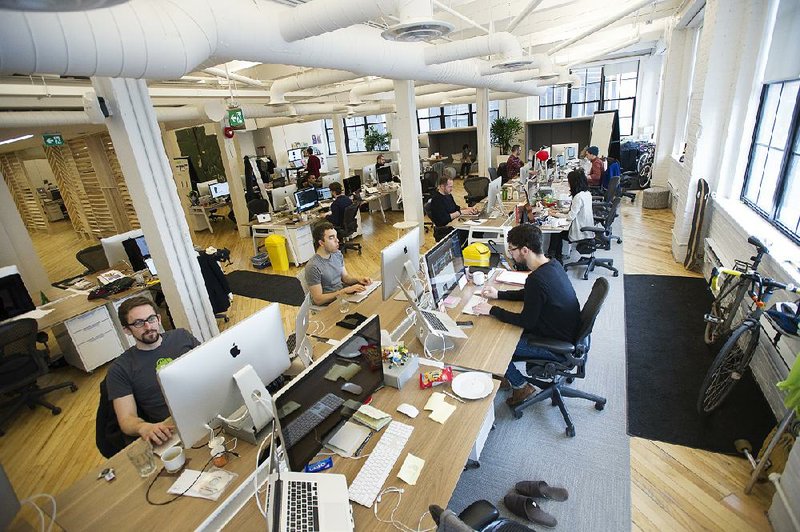TORONTO -- Marc Shewchun's aim in life was to land that slick corner office in a downtown Toronto skyscraper. Today, he works in a red-brick walk-up with quirky plumbing and worn wooden floors.
The multicolored walls of Wattpad Technology, where Shewchun is head of operations for the story-sharing website, are covered in scribbles and sticky notes from impromptu meetings. A neon orange hammock is tucked into a corner, and beanbag chairs dot the loft where employees tap away on laptops on a weekday evening.
Wattpad's digs, which housed a cigar and whiskey shop in the 1800s, are just the kind of "authentic" workplace hundreds of technology and media startups spend months hunting for. Driving the trend are millennials demanding downtown spaces that look more like upscale fraternity houses than the cubicle farms where their parents work.
"It's about the startup world not being a part of the corporate world," said Shewchun, 42, sitting behind a reclaimed wood table in the office pantry, which provides gluten-free snacks, fair-trade coffee and a popcorn maker. "The space encourages openness and a lack of hierarchy. You can make it into whatever you want. It's much more important than properly working plumbing and even floors."
Rents for brick-and-beam real estate in the city's east end, where Wattpad is based, have risen 26 percent to $16.13 a square foot from 2007 and are up 49 percent in the west end, according to data compiled by CBRE Group Inc. The cost to lease space in the best quality towers in the financial core rose 6.4 percent over the same period, the brokerage said.
Availability of historic office space is also at a record low in some neighborhoods, according to CBRE. Vacancy in the downtown west end dropped to 2.4 percent in December from 6.5 percent in 2007. That compares with a vacancy rate of 4.9 percent in December for offices in the financial core, which is approaching a decade high amid a wave of new supply.
"The type of companies located in those markets are more trendy and don't necessarily want to be in a sterile office building," Masha Dudelzak, Toronto-area research manager for the brokerage, said by phone. "They have young employees, so that's a big draw."
The technology industry is leading office demand in the city, with 17 percent of available space at the end of last year snapped up by software and Internet companies, the highest allocation to any single sector, according to brokerage Colliers International.
The supply crunch for older buildings is similar to the trend in major U.S. technology hubs. Before firms including Foursquare Labs moved there, the South of Market district in San Francisco was an industrial seaport of warehouses and seedy housing. Boston's Seaport neighborhood, where dozens of startups are now scattered along the waterfront, was a raw material shipping area in the early 20th century.
In Toronto, the in-demand buildings are just east and west of Bay Street, the financial core where the towers of the five largest banks stand. Wattpad, which is among firms that drew $1 billion in venture-capital funding in 2013, occupies three floors close to the cobblestone streets of the Distillery District. Ottawa-based Shopify is among tech firms that took up residence in the Fashion District in the city's west end.
"It's a reflection of the changing demographics of the workforce," said Satish Kanwar, product director at Shopify, which makes products that help retailers sell online and in stores. "There's an apprehension to be in a place that looks purely like it's oriented toward work. Everyone can remember their first creaky college dorm or apartment and can still associate such great memories with experiences there."
The company spent about a year finding, designing and renovating its current office, looking at about 20 other properties before choosing it. Kanwar said management crossed others off the list because they were too small, and he foresees it may be difficult to find a bigger brick-and-beam office in the future.
Shopify's space has its own bar with beer on tap, a wall of organic snacks, a game room with a couch and video game system and the building's original warehouse doors. The company currently rents 36,000 square feet, is adding a rooftop this summer and is looking to acquire more space in the building as it seeks to eventually house more than 250 employees. Walls are lined with neon signs and decals of cats.
"There's not a lot of pretending going on here," Kanwar said. "It's real, authentic."
Since there's a limited quantity of the properties available, developers are building new space on top of brick- and-beam properties. Allied Properties Real Estate Investment Trust, the largest owner of historic office space in the city, is adding about a dozen floor-to-ceiling glass stories on top of a brick building near Queen Street West, which Vogue magazine crowned the second-coolest neighborhood in the world, after Tokyo's Shimokitazawa district. The site, at 350,000 square feet, is opening later this year.
Allied also bought a heritage building last year at one of Toronto's busiest corners. The space, which was built as a hotel in 1875, will reopen as retail and office space this year. About 30 percent of the firm's tenants across Canada are technology companies.
"The millennial generation has really elected en masse to live downtown and to work downtown," said Michael Emory, chief executive officer of the Toronto-based REIT. "A lot of people would prefer not to be sitting in some commoditized cubicle in some commoditized building that rises to 80 stories."
SundayMonday Business on 03/23/2015
